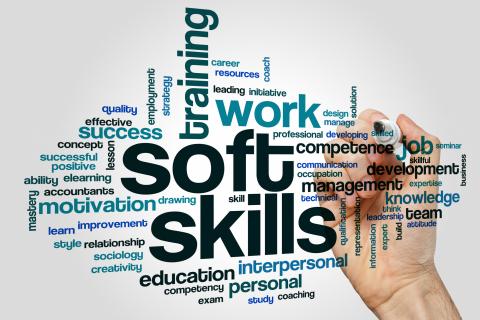Soft Skills That Can Help Improve Your Resume When Applying for Jobs
Mar 06,2023
Did you know that about 53% of college graduates cannot find a job in their field of study after graduation? Are you one of those statistics, tired of not getting the jobs you apply for?
Soft skills might be just what’s missing from your resume. They can take mundane words and make you stand out to employers. From highlighting your academic record to understanding different tones of voice on a resume, soft skills have more influence than ever before when it comes to finding a job.
When you're up against hundreds of other applications, showcase yourself in the best light by letting your soft skills truly shine through. Make sure your individual talents aren’t overlooked by creating a resume that stands out.
By brushing up on these essential soft skills, you can help elevate your entire resume. In this article, we tell you the best skills to include in your resume right now that can help you land a job in no time.
What Are Soft Skills?
Soft skills are a blend of communication, interpersonal, and people abilities; attitudes, character traits, and emotional intelligence components. Aside from your academic record, employers seek these skills out in any industry.
Examples of soft skills include, but are definitely not limited to:
- Communication
- Teamworking ability
- Leadership qualities
- Ability to solve problems
If you're on the hunt for a job, having strong soft skills can set you apart from your competition. It gives you an edge over applicants with similar educational and professional backgrounds. Recruiters will be sure to take note of the ideal candidate who stands out due to these vital abilities!
Employers agree that soft skills, such as communication and collaboration, are essential for success in the workplace. In fact, the reason why most new employees end up getting dismissed from a job is due to an inadequate set of these crucial capabilities.
The Difference Between Soft Skills and Hard Skills
Skill sets can be divided into two distinct categories: hard skills and soft skill sets. They can both be learned through academic achievements; however, the traits are very different.
Hard Skills
Hard skills, otherwise known as tangible aptitudes, range from being an expert on a certain piece of software to having the know-how of emergency care.
You can build up these hard skills through a combination of schooling, instruction, and certifications plus practical experience in your field.
Soft Skills
Soft skills are also known as people skills. These are the combination of interpersonal talents, character traits, and professional attitudes essential for success in any position.
Teamwork, perseverance, time management techniques, and effective communication are just a few examples. It's possible to acquire these fundamental soft skill attributes through life experience or education. They may come naturally due to one’s personality type.
Soft Skills Employers Love
Soft skills can be an invaluable asset that reveals how a candidate will perform in the workplace, their ability to handle challenging situations, and what possibilities there are for career growth.
Many employers will tell you that when it comes to making their choice, soft skills are just as vital, if not more so than hard skills. But what sets one skill apart from another in terms of demand? If you're wondering which ones are hot right now and likely to remain a priority, here's your answer:
Time Management
Effectively managing your time is important for optimal productivity in your daily activities.
To manage time effectively, you must learn and practice some skills. These include reducing stress, making organized systems for tasks and files, and figuring out what is most important or urgent first. Setting realistic plans that you can achieve will give results that you can measure.
Communication
Communication is a critical and essential skill for success in life, especially when it comes to the workforce.
Employers want people who can communicate well. This means talking and writing clearly, giving presentations, giving helpful feedback, and listening carefully. If you are good at these things, it will help you get a job or do better in your job!
Adaptability
You can be successful when things change at work. Showing that you can adjust your behavior to fit different situations shows that you are good at dealing with change.
Businesses can change a lot. You need to be able to adjust quickly and do the right thing.
To help you do this, learn how to stay calm when things get tough, think about things more carefully, and find ways to motivate yourself. Then you will be ready for any changes that come up at work.
Problem-Solving
It is very important to be able to think carefully and come up with creative ideas when you are trying to solve a problem. No matter what job you do, this skill will help you.
Every job has problems to solve. Companies want people who can figure out how to fix tough problems.
To do this, you need skills like being able to think logically, observe things closely, come up with ideas, and make decisions. Having these abilities will give you lots of chances for success in different kinds of jobs.
Teamwork
Teamwork is an important skill to have. It helps you do things faster and work well with other people.
Related skills help with teamwork like working out conflicts, collaborating, organizing tasks, sharing ideas, and solving problems together. All of these abilities help everyone work better together and get more done.
Creativity
People often think of creativity as only being used in art or design. But creativity is actually a lot of different skills, like asking questions and trying new things. It is useful for all kinds of jobs.
Creative skills are important. Examples of these are imagining new things, creating a plan in your mind, inventing new ideas, trying out something new, and asking questions. Even if you're not an artist, you can use these to make your work better!
Leadership
When employers are looking for someone to hire, they want someone who can be a leader. People with leadership skills show that they really care about the job and will work hard to help the company succeed.
If a person shows they have good leadership skills, an organization can trust them to do well in a higher-up job. Good leaders are usually very good at managing, being honest, teaching others, being kind, and understanding different cultures.
Interpersonal Skills
Interpersonal skills are important when you talk to people. It means being able to understand how other people feel, be funny, make friends, and accept that everyone is different. This will help you get along better with others.
Work Ethic
Having a good work ethic is important for employers. This means that you should give your best effort and try hard to do well, often going above and beyond what's expected.
A good work ethic means being responsible, disciplined, dependable, committed, and professional.
Attention to Details
Employers want workers who are very careful with their work and take the time to make sure everything is perfect. They should pay attention to even the smallest details.
It is important to have good skills like planning, being able to think about yourself, looking closely, asking questions, and observing carefully. Having these skills and wanting to do your best will make you different from other people!
How to List Soft Skills on a Resume
Now that you understand the essence of soft skills, it's time to decide which ones should appear on your resume.
Every job post has its own unique requirements. Therefore, the list of competencies in your resume must meet them. Tailoring each version of your resume for a specific role is essential if you want to land an interview.
Identify What Soft Skills the Employer Is Looking For
It's easy to do this. All you need to do is take a long, hard look at the job offer they posted and note all of the skills the employer looks for.
List Your Relevant Soft Skills
Next, write a list of all the soft skills you have. You may have to think quite creatively here, but they can come from any walk of life. Refer to our list above; you'll be surprised how many of these soft skills you have.
Compare Your List to the Job Description
To determine which soft skills to feature on your resume, pick the ones you excel at and leave out those that aren't as strong. Make sure to highlight your strengths to stand out from other candidates!
Disperse Your Soft Skills Throughout the Resume
To leverage your accomplishments to the fullest, incorporate them into individual bullet points on your resume and quantify each one. This will make a much more persuasive case for why you're an ideal candidate.
Ready to Showcase Your Soft Skills?
Soft skills are important for almost any job and employers will be looking for them when they review your resume. With careful consideration about how best to present yourself on paper, you can increase your chances of landing an interview by showcasing the right set of competencies.
Discover everything you need to know about landing your perfect job. Discover if your dream job is in high demand, what skills you need, as well as career opportunities today at the Honor Society.
Scholarships are available for many healthcare workers around the world. Read on for more information on these opportunities and how they can help.
forward
Our writing staff has created this topic suggestion for your review. Once approved, we will begin writing a full blog post on this topic.
Are you thinking of applying for academic scholarships to help with the cost of tuition? Here's a helpful guide on how to apply for scholarships.
forward
This article has been approved and all writing work is complete. The content is ready to be posted on your website.






